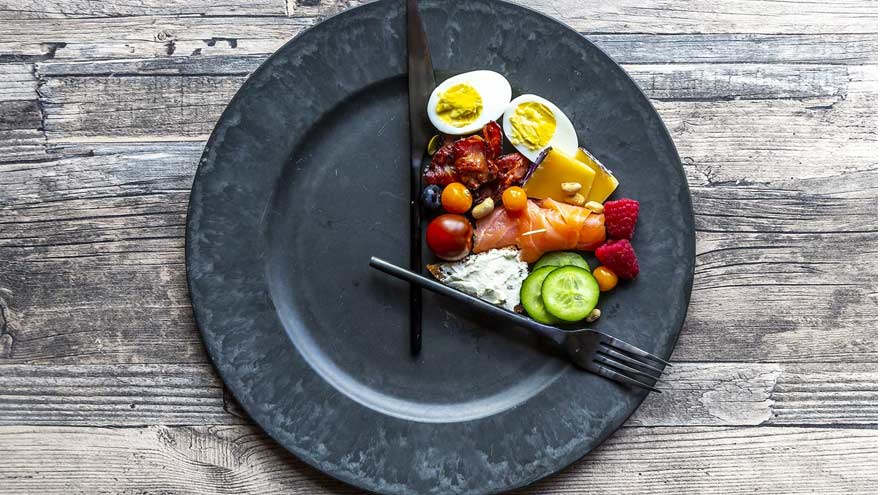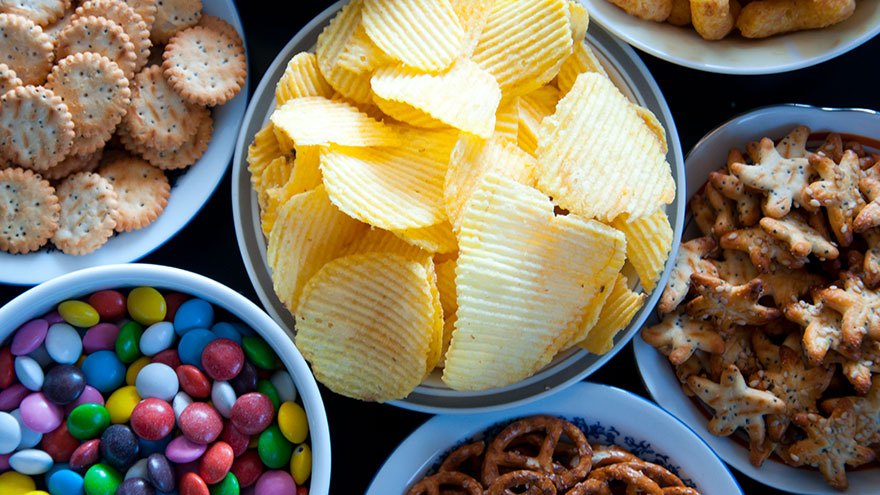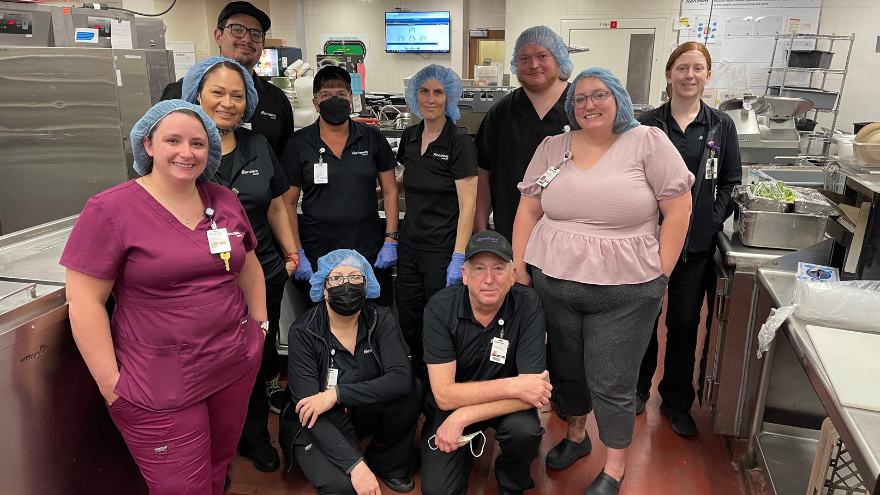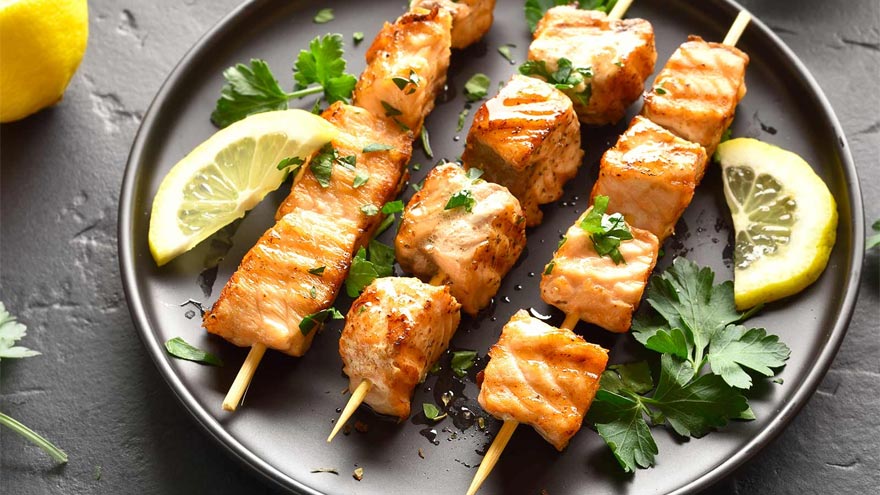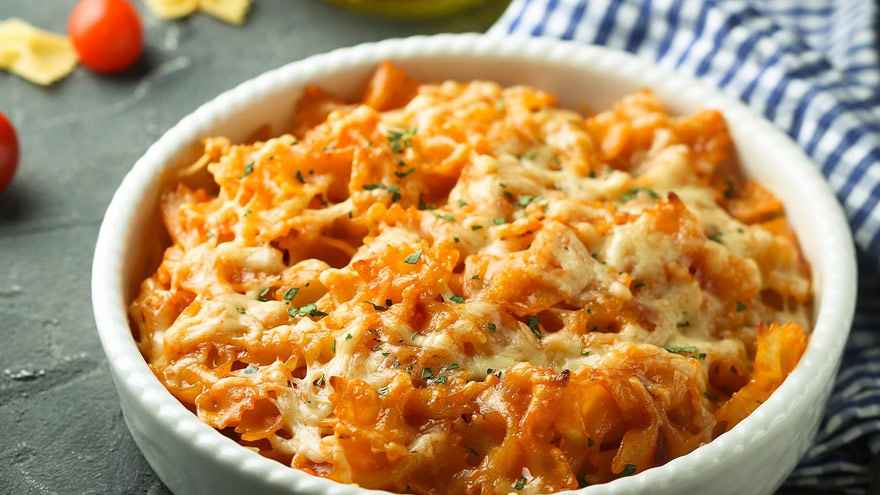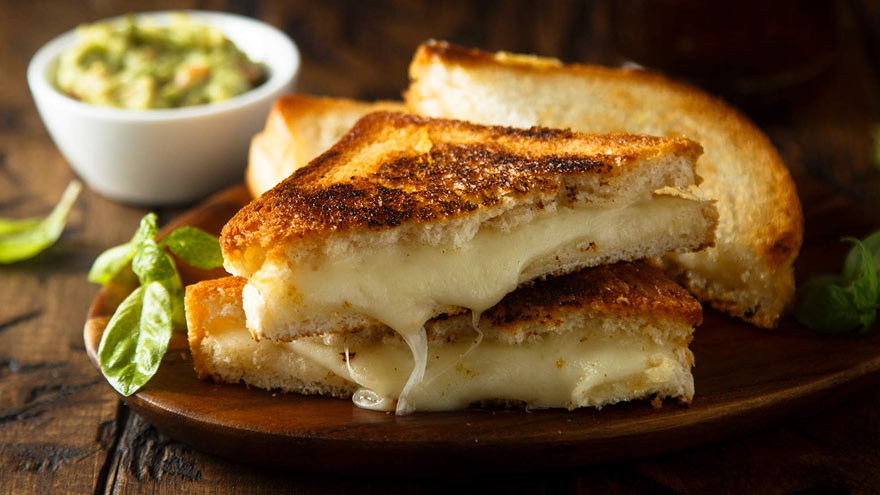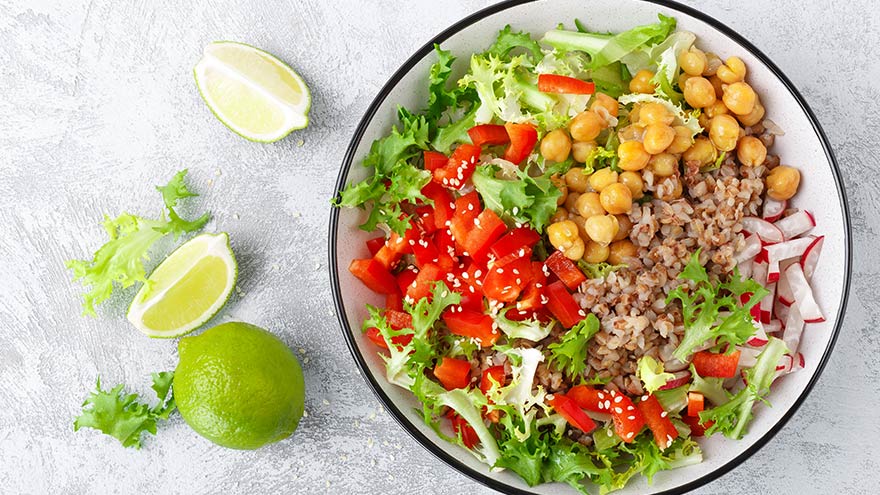Search
Results for 'what is an'
Clear-
What to Know Before You Try Intermittent Fasting
As many people search for diets to try to achieve weight loss resolutions, Kim Colegrove, Renown Dietary Educator, has all you need to know about one of the trendiest diets – intermittent fasting. What is intermittent fasting? Intermittent fasting is an eating pattern that switches between periods of fasting with no food or very restricted caloric intake, and periods of unrestricted eating. The diet has come into popularity as a way to help people lose weight without restricting what they eat, just when they eat. How does it work? The rationale behind intermittent fasting is that the pattern of eating promotes weight loss due to hormonal changes – namely, the decrease in insulin levels – as well as effects on your gut and overall decreased energy consumption. There are various schedules, including alternate-day fasting and time-restricted feeding. For example, one popular method involves restricting your eating period to eight hours per day and then fasting for the remaining 16 hours. Another requires fasting for 24 hours once or twice per week. What should people consider before they try intermittent fasting? Some people have found success in losing weight with intermittent fasting. However, it’s important to note that it’s not a diet that necessarily promotes sustainable habits and lifestyle changes. There’s also not enough research conducted that shows its lasting impact on health, weight, or metabolic improvement. For most, an intermittent fasting diet is just that – a diet. A person will likely lose weight because they consume fewer calories, but keeping the pounds off is an aspect of healthy weight loss that requires a permanent lifestyle change. Who should NOT try intermittent fasting? Intermittent fasting is not for everyone and it can pose a health risk to women who are pregnant or breastfeeding, people with diabetes, and children and adolescents in an active growth stage. Also, it would not be appropriate for those with a history of eating disorders, as well as people with certain health conditions that require them to eat every few hours. You should always talk to your doctor before beginning a restrictive diet such as this, especially if you have a chronic health condition or are taking certain medications.
Read More About What to Know Before You Try Intermittent Fasting
-
The Not-So-Fab-Five: Foods That Increase Stroke and Heart Disease Risk
Did you know that 80 percent of all strokes are preventable? Learn which foods should be eaten in moderation to reduce your family's risk of stroke. Stroke is the fifth leading cause of death in the nation and a major cause for disability, killing 130,000 people each year. But did you know that 80 percent of all strokes are preventable, according to the American Stroke Association? Several stroke risk factors -- high blood pressure, smoking, diabetes, physical activity level, obesity, high cholesterol and heart and artery disease -- can be controlled, treated and improved, right down to the foods we choose to consume each day. Diets high in sodium can increase blood pressure, putting you at greater risk for stroke. A high-calorie diet can lead to obesity -- another risk factor. And foods high in saturated fats, trans fat and cholesterol will raise your blood cholesterol levels causing blood clots, which -- you guessed it -- can lead to a stroke. The “not-so-fab” five foods listed below play a large role in damaging your body and causing vascular disease, stroke and heart disease and should be avoided on a regular basis. However: Moderation is the key to life, in my opinion. Sure, everyone is going to have a soda here and there or a steak off the grill, but keep it off the main menu. 1. Packaged and Fried Food Have you noticed foods like hot dog buns and bottled salad dressings rarely go bad? Ever asked yourself why? This is due to the use of hydrogenated oils, which are trans fats. Hydrogenated oils stay solid at room temperature and do not require refrigeration. Convenient? Yes. Healthy? No. Unfortunately, many frozen foods and meals also fall into this category, except for frozen fruits and veggies. So here’s the lowdown on trans fats: They’re considered by many experts as the worst type of fat you can consume, raising your LDL (“bad”) cholesterol and lowering your HDL (“good”) cholesterol. While some meat and dairy products contain small amounts of naturally occurring trans fat, most dietary sources are formed through an industrial process adding hydrogen to vegetable oil, causing the oil to solidify at room temperature. The FDA is in the process of restricting or possibly banning trans-fats from food in the U.S. A study published in JAMA Cardiology compared data from counties with and without trans-fat restrictions and the findings were substantial: There was a 6 percent decline in hospitalizations for heart attack and stroke in counties with trans-fat restrictions. Bottom line: Ideally no processed food should pass your lips, but realistically, aim for less than 2 grams of trans fat per day. Skip the store-bought treats at the office and fries at lunch. Also avoid crackers, regardless of what you are dipping them in. Choose to eat fruits to satisfy your sweet cravings and veggies and hummus to satisfy the savory. 2. Lunch meat Processed meats, including bacon, smoked meats and hot dogs, are all on the DNE (Do Not Eat) list, unless you want to play with fire. Processed meats are a no-go if you want to keep your arteries clear of plaque buildup. So what is the alternative to your salami sandwich? Try a healthy alternative like a tuna sandwich with avocado (a great alternative to mayo) or a veggie sandwich. 3. Diet soft drinks First of all, when a drink is sweeter than a candy bar but it contains zero sugar and zero calories, buyer beware. Many consumers think because a soda is labeled “diet” it’s a better choice, but studies have linked diet soft drink consumption with an increased risk of stroke and vascular disease. In a nine-year study of more than 2,500 people, those who drank diet soda daily were 48 percent more likely to have a heart attack or stroke or die from those events, compared with those who rarely or never drank soda. What else are you supposed to drink? If you must drink soda, break the everyday habit and drink it on special occasions; otherwise water rules. And if you don’t like water, try flavoring your water with fruit slices. 4. Good-old red meat So is there ANY good meat out there you ask? The answer is yes, but it’s not red. In the journal Stroke, an article showed women who consumed large servings of red meat regularly had a 42 percent higher incidence of stroke. Red meat is high in saturated fat, which clogs arteries with plaque. The alternative to red meat is a heart-healthy protein like poultry or fish, or even non-animal products like beans, nuts and tofu. 5. Canned foods Steer clear of factory processed soups, beans and sauces. Canned items all have incredible amounts of sodium or MSG or baking soda/powder to maintain their freshness and shelf life. One study showed if you consume more than 4,000 mg of salt per day, you more than double the risk of stroke compared to diets with less than 2,000 mg. Another tip: When possible, plan and make meals from scratch. Making the wrong meal or snack choices is one of the biggest contributing risk factors for stroke and heart disease. Most people know what good food choices are, but they don’t realize the serious impact the bad choices have on overall health. Learn what is most beneficial to your body to consume. It will be a life changer – literally.
Read More About The Not-So-Fab-Five: Foods That Increase Stroke and Heart Disease Risk
-
Celebrating Blood Sugar Balance This Holiday Season
As the holiday season draws near, we find more reasons to celebrate with loved ones. At Renown Health, we are kicking off the celebrations early this November with American Diabetes Month. Approximately 37 million Americans, including 270,000 Nevadans, have been diagnosed with diabetes with as many as 95% of those diagnosed living with type 2 diabetes mellitus (T2DM). What is Type 2 Diabetes? Type 2 diabetes is a chronic health condition that occurs because your body is not using insulin (a hormone made by the pancreas to help cells use the food we eat for energy) as well as it should, resulting in high blood sugar levels. It is important to obtain a diagnosis for T2DM and ensure it is well-controlled to prevent serious health complications. Those with diabetes are at higher risk for blindness, kidney failure, heart disease, stroke and amputation. Tips for Supporting Your Health with Type 2 Diabetes Know Your Blood Sugar Levels: Work with your healthcare provider to establish target blood sugar levels, and make sure to monitor your levels regularly as advised by your healthcare provider to prevent or delay health complications associated with T2DM. Focus on Your Plate: Eating foods such as fruits and vegetables, lean meats or plant-based proteins, healthy fats and whole grains supports diabetes management. If choosing healthy foods is difficult due to your busy schedule, cost or simply because you aren’t sure where to start, talk with your healthcare provider who may refer you to a registered dietitian. Registered dietitian nutritionists are certified nutrition specialists who can provide education and practical tips for eating to support your T2DM diagnosis with visits covered by many insurance plans. Prioritize Staying Active: Engaging in regular exercise is good for everyone, especially those living with T2DM. Exercise helps your cells become more sensitive to insulin and therefore supports healthy blood sugar levels. Always check with your healthcare provider prior to beginning a new exercise plan. Support Stress Reduction: Stress is unavoidable but can be managed through regular exercise, getting enough quality sleep (7-8 uninterrupted hours per night) and practicing meditation and other mindfulness techniques. Plan Ahead for Holiday Gatherings: There’s still room for celebration while focusing on blood sugar management. Consider bringing a healthy dish to your gathering, focus on filling your plate with vegetable sides and eating those first and incorporate a family walk after dinner. If traveling, pack nutritious snacks that support your health and keep you full. Lastly, enjoy the special dishes and desserts this season has to offer in single-serving portions.
Read More About Celebrating Blood Sugar Balance This Holiday Season
-
Department Spotlight: Food & Nutrition Services
Nutrition is a vital aspect of patient care. At Renown Health, the Food & Nutrition Services (FNS) teams take their mission of delivering patients high-quality, cost-effective, nutritious and attractive foods to the next level. From a thrice-daily trayline service with a wide variety of delicious food to the personalized dietitian services that ensure every patient gets the nutrients they need for optimal healing and recovery, Renown’s FNS teams at Regional, South Meadows and Rehab are unmatched. Food for the Good Fight The hustle and bustle of early morning food preparations gears the FNS team up to, as Renown Regional Food Service Worker Molly Kalsman puts it, “provide patients with adequate nutrition to heal.” From morning until nighttime, the team prepares three meals a day along with late trays and snacks. This isn’t your run-of-the-mill hospital food, either. Think anywhere from cheeseburgers and salads to pork roasts and baked potatoes. As you can imagine, food of this caliber requires all hands on deck in the kitchen, especially during trayline times, to ensure all patients receive quality meals that meet their individual nutrition needs. “We make an impact with good service and great food,” said Mario Nunez, a Food Service Worker at Renown South Meadows. As the food service workers are hard at work cooking and assembling, the nutrition representatives visit each patient to learn their individual dietary restrictions, allergies and food preferences. For Julie Macaluso, Nutrition Representative at Renown South Meadows, “letting the patients choose their meals” is one of the highlights of her job. “We go over meal choices for their stay, so the patient can pick out something they would like to eat and find enjoyable,” added Tara Sprehe, Nutrition Representative at Renown Regional. The immense care and attention our nutrition representatives give to every patient paves the way for our clinical dietitians to build a nutrient-dense diet plan based on the individual patient’s preferences. Dietitians are the only licensed providers that can leverage nutrition to treat, manage and prevent illness and disease to improve patient outcomes. Every day, our experienced dietitians “make recommendations in the adjustment of macro and micronutrients in order to best manage a person’s health status in the setting of trauma, diabetes, heart disease and other morbidities,” said Jessica Blauenstein, a Registered Dietitian and Board-Certified Specialist in Oncology Nutrition at the William N. Pennington Cancer Institute. Overall, for this department, the phrase “that’s not my job” will never be heard, according to Lupe Ayala, a Cook at the Renown Rehabilitation Hospital. Day-in and day-out, it’s a massive group effort – and that’s the way they like it. Setting the Service Bar High Hitting milestones and accomplishments comes naturally to this crew. The FNS team sets the bar incredibly high for food and service standards across the Renown Regional, South Meadows and Rehabilitation hospitals. The key ingredient? Synchronized teams that operate like a well-oiled machine. The meticulous trayline schedules and assembly lines, the cooks that put their heart into patient meals, the nutrition representatives and dietitians who ensure patient food wants and dietary needs are being met... the list goes on. And to top it all off, these teams certainly know the meaning of “service with a smile.” Their efforts do not go unnoticed. “I am very proud of the team I have,” said Monica Lara-Yanez, Supervisor of Food and Nutrition Services at Renown South Meadows. “They have improved their knowledge and participated in cross-training, and they are very efficient doing their jobs and helping each other. Moreover, they care about the service we provide.” One major accomplishment the FNS department achieved in recent years was implementing Room Service Connect, which aids in direct communication with patients, letting them know what foods are available to them during their stay at Renown based on their dietary needs. Locating trays of food has also never been easier. According to Tara Sprehe, “This system is also beneficial for letting food service workers know when a diet has been upgraded, discontinued, changed to NPO status or downgraded. This reduces the risk of giving the patient a diet that is not appropriate for them,” which saves both time and money for the department. At the end of the day, the FNS department has one mission, and it’s the same mission we all employ as Renown team members: do it for the patient. “It’s all about patient care,” said Jesse Holman, Cook Lead at Renown Regional. “That is the best accomplishment!” A Dedication to Renown The patients, the providers, and the passion: these are the most common themes that keep the FNS department passionate about Renown and their team. Whether they are just starting out in a career in food service or have established themselves in the clinical field, the FNS department proudly upholds the greatest standards of nutritional care that enhance Renown’s status as a top healthcare leader in northern Nevada. “I choose Renown because it is a very distinguished institution with an amazing reputation, offering a lot of benefits and growth opportunities to employees,” said Monica Lara. “It makes me feel proud to say, ‘I work at Renown.’” Renown Rehab Food Service Worker Margretta Corbet echoes this sentiment, adding, “There are good people here with happy dispositions.” Many FNS team members are especially enthusiastic about Renown’s robust benefits and career growth opportunities. For Molly Kalsman, working at Renown gives her the experience necessary to enter a career in dietetics. “Food service and hospital experience is encouraged to be accepted into a dietetics internship program, and Renown was the perfect opportunity for me to gain that experience,” said Molly. Carleigh Bates, Nutrition Representative at Renown South Meadows, is on a similar path: “Renown is a vehicle for so many things I am aspiring towards, such as getting my foot in the door for working in healthcare, improving the experiences of patients and gaining experience that will aid in my future goals.” Carleigh emphasizes that the team’s commitment to Renown’s mission is at the core of what they do every day. “We impact patient care by providing nutrition to fuel their wellness and improve their stay.” Lupe Ayala wraps up this strong conviction from the team very well: “I didn’t choose Renown; Renown chose me.” Fight the Good Fight With Us This future-minded, patient-centric department is growing! The Food & Nutrition Services teams at Regional, South Meadows and Rehab are actively hiring eager, collaborative new team members. Natasha Frisbie, FNS Lead at Renown Regional, reports that the team has “successfully hired and trained 24 new employees in the past three months” and is still expanding. “Teamwork, communication, and enthusiasm are very valuable skills to have in this department,” said Molly Kalsman. If you or anyone you know is looking for their next growing career opportunity, apply today!
Read More About Department Spotlight: Food & Nutrition Services
-
Recipes Healthy Flourless Sweet Potato Brownies
Rich, dark and super chocolaty, these sweet potato brownies are perfect for those following a paleo, vegan, gluten-free or dairy-free lifestyle.
Read More About Recipes Healthy Flourless Sweet Potato Brownies
-
Grilled Lemon Salmon Kebabs
Salmon is a highly nutritious fish loaded with heart-healthy fats. A 3-ounce portion of salmon contains between 700–1,800 milligrams of omega-3 fatty acid. Research indicates that diets rich in omega-3 fatty acids can reduce inflammation and heart disease risk. Because salmon can be a strong flavor, lemon helps balance and bring a light citrus taste. In contrast, dill adds a slightly green, fresh note to this entrée. So, if you’re looking for a quick and wholesome meal, try this grilled lemon salmon kebabs recipe—ready in just 20 minutes!
-
Bruschetta Chicken Bake
Bruschetta Chicken Bake is quick, affordable, and super easy to prepare on a busy schedule. The best part is that you don’t even have to pre-cook the chicken! Instead, serve this meal with a bagged salad and a crusty loaf of bread, and you’ll have a healthy, homemade dinner on the table in no time!
-
Renown Health Food Pantry Nourishes Patients in Need
Unfortunately, many in our community go to bed hungry. Thanks to the support of the Food Bank of Northern Nevada and other local partners, Renown’s food pantry is helping meet the food needs of homeless and low-income individuals in our community. Patients who qualify for the “Food is Medicine Prescription” can receive a bag of food for themselves and each member of their immediate family every week through a free assistance program. This project started last year when Renown began giving food support to hospital and emergency room patients who expressed the need. Food is also given out at the Healthcare Center, which provides affordable access to care for anyone in our community. Those who receive care at the Healthcare Center are also eligible for food assistance. Working Alongside the Community After receiving food deliveries from the Food Bank of Northern Nevada, Renown’s community health team collects an assortment of fresh produce, donated from local grocery stores and other community organizations. Then they put together one bag for each family filled with healthy foods, such as: Whole grain cereals Shelf stable milk Kid-friendly snacks (granola bars, popcorn, graham crackers Proteins (low-salt soups, stews, peanut butter) Seasonal produce Food is Medicine Prescriptions Continue Amidst the Pandemic Throughout the COVID-19 (coronavirus) pandemic, Renown’s community health workers have been working remotely. They continue to reach out to patients who need groceries from the Food is Medicine Prescription program. With this in mind, the food pantry staff is currently coordinating outpatient deliveries to those with a Food is Medicine Prescription. At present, Renown is working to get more refrigeration, shelving and staffing to expand the service to more Renown Medical Group patients in need of food.
Read More About Renown Health Food Pantry Nourishes Patients in Need
-
Nourishing Your Loved One Through Cancer Treatment
Eating healthy is a daily challenge for many, but for those with cancer, it is an even harder struggle. A cancer diagnosis affects not only those diagnosed but family members and friends, too. One key area of concern is making sure your loved one stays well by eating healthy food every day. Here are some vital cancer nutrition tips from Jessica Blauenstein, a Board Certified Specialist in Oncology Nutrition and Registered Dietitian at Renown Health. Help to Prepare Meals and Snacks for Daily Cancer Nutrition Make it grab and go. Easy-to-make meals help reduce the burden of having to cook and prepare food. Having easy to grab snacks on the counter or in the fridge can help ensure your loved one has access to those nutrients when needed. Sit outside of the kitchen. This allows your loved one to avoid cooking smells which can make them feel sick as a side effect of cancer treatments. Also try serving them cold foods such as sandwiches, cheese and crackers, or shakes which have a mild scent. Try drinkable meals. Some people with cancer find it easier to sip their calories over the course of 30 minutes to an hour. Consider smoothies or supplemental shakes such as Ensure Complete, Fairlife shakes, Orgain shakes, or Boost Plus to name a few. A great foundation for a smoothie is a protein source (Greek yogurt, protein powder, nut butters or milk) with a carbohydrate (fruits, juice or berries). Add other ingredients as desired, such as spinach, kale, and ground flaxseed or chia seeds to give it more vitamins, minerals, and fiber. Snack Ideas for Those Undergoing Cancer Treatment The following ideas are both quick and easy to make for your loved one. Chicken or tuna salad with whole grain crackers or as a sandwich on whole grain bread Greek yogurt mixed with cereal, fruit and/or nuts Cottage cheese with banana, cinnamon and/or peanut butter Favorite fruit with 100% natural peanut or almond butter spread - Try peanut butter with bananas, apples, or even celery Their favorite veggies dipped in a salad dressing of your choice - For example, carrots with hummus, tahini, or ranch dressing Cheese and whole grain crackers - Add tomato slices with a small amount of avocado, and a dash of oregano on top for more flavor Eggs scrambled with cheese, vegetables and/or salsa Peanut butter and jelly sandwich on whole grain bread A baked sweet potato with some favorite toppings Hard boiled eggs and/or egg salad with whole grain crackers, or as a sandwich on whole grain bread Oatmeal or cream of wheat prepared with milk, fruit and/or nuts Sometimes your loved one may not feel like eating or refuse to eat. If treatment side effects are impacting your loved one’s ability to eat, please visit the websites below containing recipes tailored to treat side effects. Cook for Your Life ELLICSR Of course, you may also consult a registered dietitian and/or the patients care team, if you have more cancer nutrition concerns.
Read More About Nourishing Your Loved One Through Cancer Treatment
-
Make a Healthier Grilled Cheese Sandwich
Friday, April 12 is National Grilled Cheese Sandwich Day! So Let us help you create a healthier melt-in-your-mouth version to this popular cheesy sandwich. Ah, the grilled cheese. It’s the quintessential comfort food that not only pairs easily with a cup of soup, but it’s easy to whip together with just a few ingredients. There are many reasons to celebrate the gooey cheesiness of this toasted sandwich, but at nearly 700 calories, it’s definitely an occasional treat. But with just a few ingredient swaps — think light mayonnaise or toasting the bread in a toaster instead of slathering it in butter — you can remake your grilled cheese into a mouth-watering and nutritious meal. We’ve compiled a couple of easy substitutions, and some of our favorite healthy twists, so you can try a new variation of an old favorite. Be Choosy with Your Cheese It’s the star of your sandwich, but do you need to always grab the yellow slices? Try to opt for stronger flavors, like blue cheese or extra-sharp cheddar, to help you retain flavor while using less cheese on your sandwich. Better Bread Goes A Long Way Plain old white bread might be your toast of choice, but by choosing a whole wheat or multi-grain bread for your sandwich you’re not only adding in new crunch and flavor, you can also increase your fiber and nutrient intake. Hold the Butter Your mom, and maybe even your grandmother, probably spread a layer of butter on your grilled cheese throughout your childhood. But know this: It isn’t necessary. While butter helps crisp the crust, it doesn’t add too much in the way of flavor. Instead, brush the bread with olive oil, or try using a thin layer of reduced-fat mayonnaise or a creamy spread. Or skip grilling altogether by toasting your bread and then baking your sandwich open faced in the oven for a few minutes at 350 degrees. Healthier Options Looking for a new twist? Here are three incredibly tasty (and healthier) versions of the traditional grilled cheese sammy. 1. Baby Swiss And Tomato Grilled Cheese 2. Green Grilled Cheese 3. Spinach, Pesto & Havarti Grilled Cheese
-
Motivating Kids to Eat Healthy Foods
Do you have a picky eater in your household? Or maybe you've got a snack monster who’s all about chips and candy? We're here to share a few fun strategies to motivate your little superheroes to snack on healthy foods instead! Rainbow Power-Up Eating a rainbow isn't just for unicorns! Different colors mean different powers: Red foods like strawberries and tomatoes help your heart. Orange foods like carrots and sweet potatoes help your eyes spot things like an eagle! Green foods like spinach and broccoli help you grow super strong bones. So, create a plate with as many colors as possible. The more colors, the more powers! Super Smoothies Blend your favorite fruits, such as bananas, berries and mangoes. Add some milk or yogurt and a handful of spinach. Your kids won't taste the spinach, and they'll drink a supercharged smoothie that gives them the energy to tackle any challenge. Create a Parfait Packed with Delicious Layers! Veggie Villans Who said veggies can't be fun? Turn them into heroes by giving them cool names and fun shapes. Make carrot sticks "Captain Crunch" or broccoli florets "Broc the Rock." Dip them in hummus or peanut butter for an extra flavor kick. Snack Attack Plates Create snack plates that are as fun as they are nutritious. Combine: Cheese cubes Grapes or apple slices Nuts or seeds Whole-grain crackers Mix and match these for your perfect plate! Make Your Own Trail Mix Fuel-Up Challenges Challenge your kids to eat three different healthy foods each day. Turn it into a family game to see who can eat the most colors or try the most fruits and veggies. You can even draw up a "super snacks" chart to keep track of your progress. Final Super Tip! Even superheroes have cheat days. Don't worry if your family doesn't eat healthy every meal. Just aim to eat more of the good stuff than the not-so-great stuff. Your kid's bodies will reward them with tremendous energy, focus and strength.
-
Summer Buddha Bowl
Say Hello to Summer in a Bowl If you've wanted to add a heart-healthy dish to your recipe repertoire, now's the time. This tasty vegan bowl loaded with turmeric chickpeas, marinated tofu and quinoa offers essential nutrients and beneficial fats to help maintain healthy cholesterol levels and reduce the risk of heart disease.
